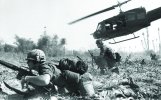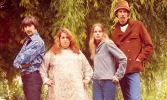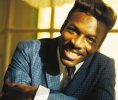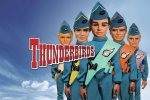Blue Moon Rock Evolution – 1965
After years of providing military assistance to the South Vietnamese government, the US finally committed ground combat troops on 8th March, with 3,500 Marines arriving in Da Nang. As the year progressed, President Johnson announced his order to increase the number of United States troops in South Vietnam from 75,000 to 125,000, and to more than double the number of men drafted per month - from 17,000 to 35,000. He also signed a law penalizing the burning of draft cards with up to 5 years in prison and a $1,000 fine. In November, the US fought its first major battle of the war against North Vietnamese troops at Ia Drang.

Human right activist, Malcolm X, was gunned down while giving a speech at the Audubon Ballroom in Harlem, whilst in Selma, Alabama, in an incident that became known as bloody Sunday, State Troopers attacked 525 civil rights demonstrators as they attempted to march to the state capitol of Montgomery.
Meanwhile, African countries demanded that the United Kingdom use force to prevent Rhodesia from declaring unilateral independence. With the Soviet Union declaring its support of African countries in case Rhodesia unilaterally declared independence, the white-minority government of Ian Smith unilaterally declared independence. A UN Security Council resolution (voted 10–0) recommended that other countries not recognize independent Rhodesia and that all states stop trading with Rhodesia.
The Beatles, Bob Dylan and The Beach Boys continued to dominate the music scene, but all of the aforementioned world turmoil and social unrest fuelled the counterculture revolution of the 1960s and leads nicely into the first featured song for 1965, and a significant artist for our playlist: Barry McGuire.
"Eve of Destruction" - Barry McGuire

Incredibly, Barry McGuire’s "Eve of Destruction", became a #1 record by accident.
Even though he’d already written and recorded his own number one song, “Green, Green”, Barry McGuire was on the lookout for new material at the start of his solo career.
Written by songwriter P.F.Sloan, "Eve of Destruction" was a song that, according to Sloan, McGuire didn’t seem to like that much. However, he selected a number of Sloan’s song to record, and “Eve” was lower down the list on the off chance that there was time to record it.
According to Sloan, “If you listen to the recording, he's rushing because of the time constraints, and he was reading it for the first time off a piece of paper." Not only that, the vocal track that McGuire managed to lay down was only supposed to be a “rough cut”, but it was somehow leaked to a DJ who began playing it.
The song references social issues of the day, including the Vietnam War, the draft, the threat of nuclear war, the Civil Rights Movement, turmoil in the Middle East and the American space program.
"California Dreamin'" - The Mama & The Papas

"Eve of Destruction" is not Barry McGuire’s only mention in this write-up. In 1963, John and Michelle Phillips were living in New York City and missing sunny California. John dreamed about the song and woke Michelle up to help him write it. The song encapsulates the feeling of longing for the warmth of California during a cold winter, and a visit to St. Patrick's Cathedral inspired the second verse ("Stopped into a church...").
After being introduced to Lou Adler, the head of Dunhill Records, by McGuire, they earned their first record contract. As a thank you to Adler, they gave the song to McGuire and even sang back-up vocals on the version of the song that appeared on his album,
This Precious Time.
Adler, impressed with the Mamas and the Papas, then had the lead vocal track re-recorded with Denny Doherty singing, but paired with the same instrumental and backing vocal tracks, and an alto flute solo by Bud Shank, reportedly improvised. The guitar introduction was performed by P. F. Sloan, writer of McGuire's hit "Eve of Destruction" and "McGuire's original vocal can be briefly heard on the left channel at the beginning of the record, having not been completely erased. For a bit of fun, go and listen to Barry McGuire’s version – I know which I prefer!
The song is known for its haunting flute solo and superb harmony vocals, which were key to the sound of The Mama and The Papas, the use of a minor key adding to the song’s melancholic and dreamlike quality. Although the single was released in November 1965, it wasn’t until the following year that it hit number one on the US charts, becoming one of the defining songs of the 1960s counterculture movement.
"In the Midnight Hour" - Wilson Pickett

Wilson Pickett's "In the Midnight Hour" is a song that has strong links to a band that have been mentioned in previous write-ups.
Steve Cropper, guitarist with Booker T & The MGs, wrote the song with Pickett. According to Cropper, the president of Atlantic Records, Jerry Wexler, said he was going to bring Wilson Pickett down to the Stax studio to record." As noted in the 1962 write-up, Cropper worked in the Stax record shop, and he set about finding some songs that Pickett had previously sung on in order to get a feel for how they might work together. The guitarist found a song on which Pickett sang the words "I'll see my Jesus in the midnight hour!" (likely to be "I Found a Love", a 1962 song by The Falcons) and Cropper decided to use the phrase "in the midnight hour" as the basis for an R&B song.
The song was recorded at Stax Studios, Memphis, May 12, 1965, with a band that included not only Cropper, but Al Jackson (drums) and Donald "Duck" Dunn (bass) from the MGs.
According to Cropper, "Wexler was responsible for the track's innovative delayed backbeat", as Cropper revamped his planned groove for "In the Midnight Hour" based on a dance step called the Jerk, which Wexler demonstrated in the studio. According to Cropper, "this was the way the kids were dancing; they were putting the accent on two. Basically, we'd been one-beat-accenters with an afterbeat; it was like 'boom dah,' but here was a thing that went 'um-chaw,' just the reverse as far as the accent goes."
“Like A Rolling Stone” - Bob Dylan
In early 1965, after returning from the tour of England documented in the film
Don’t Look Back, Dylan was unhappy with the public's expectations of him and the direction his career was taking. So much so that he even considered quitting the music business. But according to an interview in a 1966 edition of
Playboy, Dylan said that "'Like a Rolling Stone' changed it all. I mean it was something that I myself could dig. It's very tiring having other people tell you how much they dig you if you yourself don't dig you."
The song' lyrics originated in a 20-page piece of verse Dylan wrote in June 1965, after his return from England. Eventually, he managed to distil this draft into four verses and a chorus. The recording sessions were produced by Tom Wilson, with different takes of the song recorded in different styles. On the second day of recording, 21-year-old session guitarist, Al Kooper, joined the musicians. After a couple of takes, producer Wilson changed some of the musicians around and Kooper asked if he could play the Hammond organ. Wilson scoffed at the idea of the youngster playing the instrument, stating that he was "not an organ player". But Kooper didn't hear a "no", so he improvised the now-famous riff on the spot. When Dylan heard the playback, he insisted that the organ part be turned up in the mix.
Rolling Stone magazine listed it at No. 1 on their 2004 and 2010 "500 Greatest Songs of All Time" lists. At an auction in 2014, Dylan's handwritten lyrics to the song fetched $2 million, a world record for a popular music manuscript.
“Norwegian Wood (This Bird Has Flown)” – The Beatles
"Norwegian Wood (This Bird Has Flown)" is the second track on The Beatles'
Rubber Soul album.
Credited to the Lennon–McCartney songwriting partnership, there are conflicting stories over how much of the song was written by John Lennon and how much by Paul McCartney.
At one stage, Lennon claimed that McCartney assisted only in the middle eight and later that it was his song entirely, but McCartney claims that Lennon only arrived with the opening couplet and they finished the song together.
McCartney explained that the term "Norwegian Wood" was an ironic reference to the cheap pine wall panelling then in vogue in London.
Influenced by the introspective lyrics of Bob Dylan, the song is considered a milestone in the Beatles' development as songwriters. The track features a sitar part, played by lead guitarist George Harrison, that marked the first appearance of the Indian string instrument on a Western rock recording.
"Norwegian Wood" was influential in the development of raga rock and psychedelic rock during the mid-1960s. The song also helped elevate Ravi Shankar and Indian classical music to mainstream popularity in the West. Many other rock and pop artists, including the Byrds, the Rolling Stones and Donovan, began integrating elements of the genre into their musical approach. "Norwegian Wood" is also recognised as a key work in the early evolution of world music.
Other Songs
The British Invasion showed no signs of slowing down in 1965, exemplified by two songs that would go on to be rock classics; "(I Can't Get No) Satisfaction" by The Rolling Stones and “My Generation” by The Who.
Two more soul classic appeared this year. "Nowhere to Run" by Martha and the Vandellas was a big hit for Berry Gordy's Motown label and was written and produced by Motown's main production team of Holland–Dozier–Holland.
"The Tracks of My Tears" by The Miracles was co-written by Smokey Robinson and was recorded on Motown's subsidiary label, Tamla. In 2021, Rolling Stone magazine ranked the song the greatest Motown song of all time.
The Beach Boys continued their amazing run of hits with “California Girls”, and another Dylan track was also flying high this year with The Byrds releasing the
Mr. Tambourine Man album, the title song topping the charts on both side of the Atlantic.
Albums
There were definitely album worth sitting up and taking notice of in 1965, the most significant of which have songs in the playlist.
Rubber Soul – The Beatles
The AllMusic Review states that: “Musically, too, it was a substantial leap forward, with intricate folk-rock arrangements that reflected the increasing influence of Dylan and the Byrds.”
Highway 61 Revisited – Bob Dylan
Writing for PopMatters, critic Hank Kalet said that the album was the most "electrifying" rock and roll record ever and "one of a handful of albums (including the Beatles'
Rubber Soul and
Revolver) that gave literate rockers the green light to create a kind of intelligent, probing rock music that had not existed before".
Out of Our Heads – The Rolling Stones
AllMusic: "the Stones finally proved themselves capable of writing classic rock singles that mined their R&B/blues roots, but updated them into a more guitar-based, thoroughly contemporary context."
The Who Sings My Generation – The Who
AllMusic: "An explosive debut, and the hardest mod pop recorded by anyone."
Going to a Go-Go – Smokey Robinson and the Miracles
AllMusic: "the first six songs make for the best side of any original Motown LP of the '60s"
Other News
In the UK, our great wartime leader, Sir Winston Churchill, died and was given a state funeral. The Pennine Way officially opened and on 30th September, the classic family sci-fi show Thunderbirds debuted on ITV in the United Kingdom.

On 6th October 6, Ian Brady, was arrested for killing Edward Evans.
In November, the BBC was forced to issue an apology after theatre critic Kenneth Tynan said "fuck" during a discussion on BBC satirical programme BBC-3.
In sport, Muhammad Ali knocked out Sonny Liston in Lewiston in the first round of their championship rematch with the "Phantom Punch". The times they were a-changing in the world of Cricket – The
Imperial Cricket Conference was renamed to
International Cricket Conference and new rules were adopted to permit the election of countries from outside the Commonwealth. But Manchester City were still languishing in the old second division, finishing well off the pace in 11th position.
There was a couple of epic films released in 1965:
The Sound of Music and
Doctor Zhivago, in addition to perennial Christmas favourite,
Von Ryan’s Express.
1965 was also the year that Tokyo officially replaced New York as the largest city in the world.
1965 Playlist





